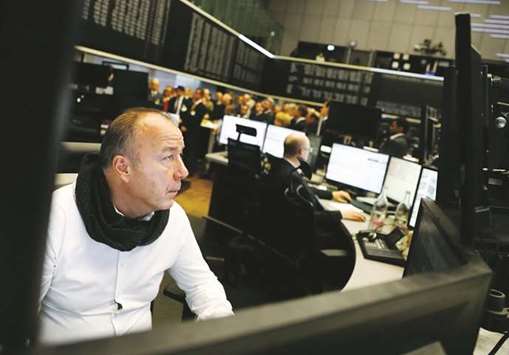European stock markets ended the session higher yesterday, shrugging off a political crisis in Germany where talks to form a new government collapsed.
At the close of trading, Frankfurt’s DAX 30 index was up 0.5% at 13,058.66, bouncing back from a weaker start, France’s CAC 40 also added 0.4% to 5,340.45, while London’s FTSE was up by a modest 0.1% at 7,389.46.
A stronger showing on Wall Street – kicking off a holiday-shortened week that will launch the Christmas shopping season – helped underpin the upward momentum, traders said.
“European equities are in recovery mode, having initially opened lower after German coalition talks fell through late last night,” said Accendo markets analyst, Henry Croft.
Investors were asking themselves whether a first-ever election re-run would be needed or a Merkel-led minority government, the expert said.
Merkel herself said new elections would be “the better path.”
Earlier, the country’s president, Frank-Walter Steinmeier, had urged the political parties to rethink their positions and find compromises.
Merkel in September won her fourth national poll victory, but bled more than one million votes to the far-right AfD, plunging her own party into weeks-long coalition talks that have now failed.
“In case there will be new elections there is a good chance that Merkel might get a better result especially as the German economy has been booming since the election back in September,” said Markus Huber, a trader at City of London markets.
The leader of the pro-business FDP, Christian Lindner, walked out of talks, saying there was no “basis of trust” to forge a government with Merkel’s conservative alliance the CDU-CSU and the ecologist Greens.
There are fears the country could be gripped by months of paralysis with a lame-duck government, while Merkel’s political future has also been called into question.
Meanwhile, on the other side of the Atlantic, analysts were expecting lower-than-usual trading volumes due to the Thanksgiving holiday, which will shut markets on Thursday and result in a half-day of trading on Friday.
Oil prices fell back after rallying almost $1.50 on Friday when Saudi Arabia’s Energy Minister Khalid al-Falih said he remained committed to an Opec deal to limit production.
Oil prices have risen in recent months, after both the Organisation of Petroleum Exporting Countries and non-Opec countries struck a landmark deal in late 2016 to cut crude production in an effort to combat a global supply glut.

A share trader checks his screens at the Frankfurt Stock Exchange. At the close of trading yesterday, Frankfurt’s DAX 30 index was up 0.5% at 13,058.66.
